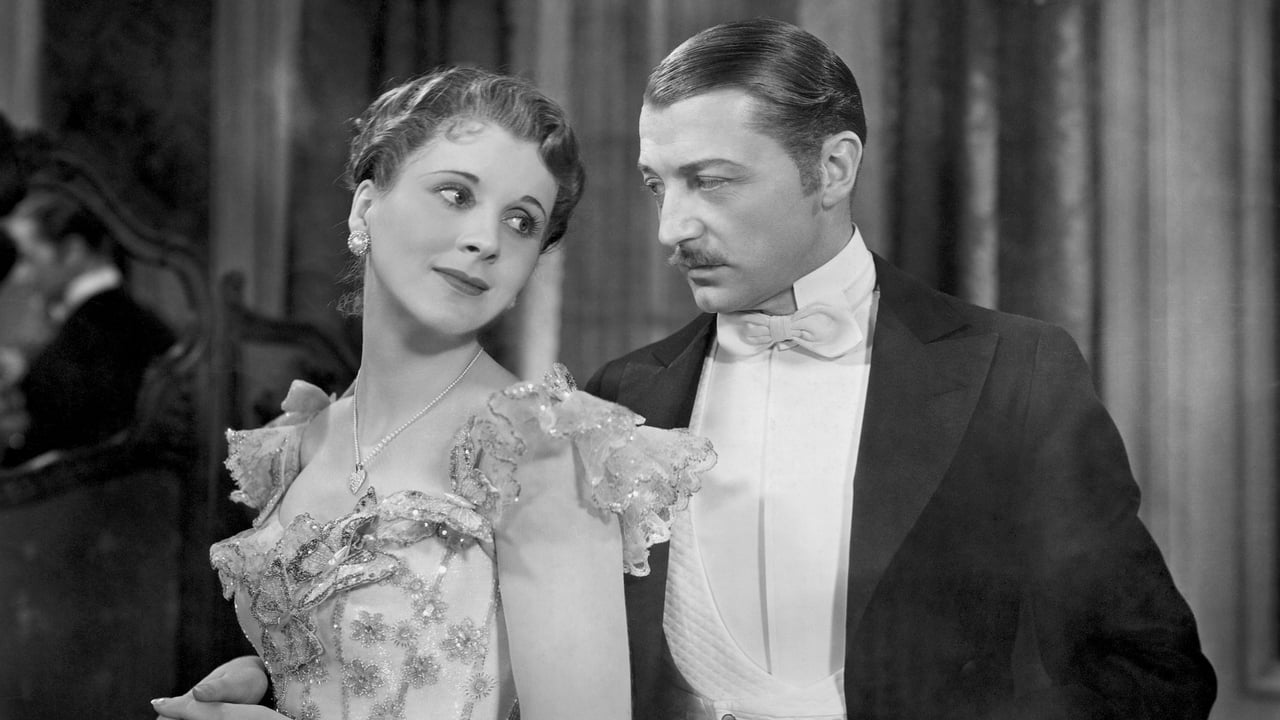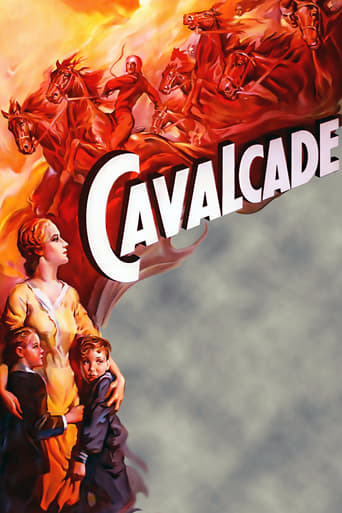

Fifty years before Woody Allen's Zelig (1983), which preceded Robert Zemeckis's Forrest Gump (1994) by more than a decade itself, this sprawling spectacle of a drama features its characters in (or during) various real life, historical events (the Boer War, the Titanic, World War I, etc.) to help tell its 33 year story. It earned director Frank Lloyd his second and last Best Director Academy Award (on his second to last nomination). The film also won the Best Picture & Art Direction Oscars, and lead actress Diana Wynyard earned her only recognition from the Academy with a Best Actress nomination.If you haven't heard of Wynyard before, don't be surprised - primarily known as a London stage actress, she appeared in only half a dozen films in the 1930's (her debut in Rasputin and the Empress (1932), the only film featuring all three Barrymore siblings, directly preceded this one) and only twice that number in her career (most notably, in the British version of Gaslight (1940) opposite Anton Walbrook). In this film, she reminded me of Norma Shearer, whom she resembles, except for the fact that Wynyard under plays her character (at least, relatively).Many film fans won't recognize all of the other names in the cast either, which includes: Clive Brook, Una O'Connor, Herbert Mundin, Beryl Mercer, Irene Browne, Frank Lawton, Ursula Jeans, Margaret Lindsay (her sixth film), John Warburton and Bonita Granville (their third films), among others. It's a British story with an "upstairs downstairs" subplot, from Noel Coward's play, which was produced by a Hollywood company (20th Century Fox). Reginald Berkeley wrote the screenplay, and Sonya Levien provided continuity.It's New Year's Eve, 1899! Upstairs, Jane (Wynyard) & Robert (Brook) Marryot are toasting the coming century before he must go and serve as an officer in the Boer War (Africa). Downstairs, their servants Ellen (O'Connor) & Alfred (Mundin) Bridges can appreciate their bittersweet celebration because he too must soon leave, as an infantryman. Mercer plays the cook; Tempe Pigott plays Alfred's disagreeable mother-in- law.The Marryots have preteen two sons, Masters Edward (Dickie Henderson) and Joey (Douglas Scott), who play with Edith (Sheila MacGill), the daughter of Jane's lifelong (and film-long) best friend, Margaret Harris (Browne). The Bridges have a new baby named Fanny. After both soldiers return uninjured from the war, Robert helps Alfred go into business for himself, lending him the money he needs to buy a pub. Merle Tottenham plays the Marryot's newest servant (later, she marries, Billy Bevan).Ten years later, Fanny (now played by Granville) is a dancing prodigy. Alfred, who has been drinking away his bar's profits, is killed when he struggles away from some friends and staggers into the street in front of a speeding fire engine. Five years later, newlyweds Edward (now Warburton) and Edith (now Lindsay) wonder about what their future holds on the decks of their honeymoon cruise ... on the Titanic! When (WW I) war breaks out, Joe (now Lawton) is as excited to be joining the conflict as he was for his father 15 years earlier. Near the end of the conflict some four years later, he's predictably weary. But his spirits rise when, by chance, he sees dancer Fanny's (now Jeans) name in lights, and the two of them begin an affair unknown to their parents of differing classes. On armistice day, working class success Ellen Bridges, gaudily dressed and looking uncomfortable in high heels, visits Jane to tell her about their "children's" affair. But they're interrupted by a telegram that tells Mrs. Marryot about Joe's death. Fanny sings the "Twentieth Century Blues" about it in her nightclub.After a series of montages (like those included which signified the length of the so-called Great War) including newspaper headlines spanning more than a decade, the film ends as it began with an elderly Robert and Jane, after Margaret has left, toasting the coming of 1933 on New Year's Eve.
... View MoreA cavalcade of British history flashes past the eyes of a prosperous London family and their domestics during a fairly interesting two-hour melodrama that presages both "Upstairs, Downstairs" and "Downton Abbey." From the Boer War to the death of Queen Victoria, the sinking of the Titanic and World War I, Jane and Robert Marryot watch their sons grow up and become romantically involved, watch men march off to war, watch their servants leave and go into business, watch British society change. As the Marryots, Diana Wynyard and Clive Brook have the required stiff upper lips; unfortunately the stiffness extends to other body parts in performances more suited to the stage than film. "Cavalcade" began life as a Noel Coward play, and director Frank Lloyd's adaptation often betrays its stage origins, especially when characters look past the proscenium and deliver their lines to the audience. Despite three Academy Awards, including the sixth ever awarded for best picture, "Cavalcade" betrays its age and fails to merit classic status.Although an Oscar went to art director William S. Darling, the production's limited budget shows in a lack of spectacle, despite numerous opportunities. Queen Victoria's funeral is reflected in the family's faces as they watch from a balcony. The Titanic is a white life ring emblazoned with the ill-fated ship's name. However, an extended montage of images and sounds effectively depicts World War I, a technique later reused with less effect to depict the social upheaval of the 1920's. During the brief scandalous 1920's episode, historians of gay film will note a nightclub scene that includes a Lesbian couple and two gay men, one fitting a bracelet on the other's wrist. While the images pass without comment, the intent seems to underscore an anything-goes depravity, at least in the eyes of the Marryots. However, Mrs. Marryot clearly illustrates the social changes underway when she pulls out a cigarette and even lights up in public. But, despite her personal liberation, she remains a social conservative and cannot cope with a marriage between her son and the daughter of her former domestic.While they make a valiant attempt, the upstairs actors fail to make deep impressions; they are manikins mouthing lines and depicting a social class, rather than flesh-and-blood characters. Wynyard rarely shows emotion and often stares off into space; Brook acts the English stereotype, complete with facial hair; the sons are bland and colorless. The downstairs performers fare better, led by the always entertaining Una O'Connor as the brash domestic, Ellen Bridges, and by Herbert Mundin as her husband. The colorful duo are perhaps a bit over the top, but their performances add life and, unlike the upstairs residents, their characters develop over time. Film buffs will spot a young Bonita Granville as Fanny, the Bridges's daughter. At the conclusion of "Cavalcade," the aging Marryots, tastefully powdered to suggest age, toast Britain's future on the eve of the New Year 1933, which was not only the year of the film's release, but also the year Hitler rose to power. If the oh-so-proper couple thought the prior three decades had been tumultuous, they had not seen anything yet. However, despite the film's over use of "Auld Lang Syne," viewers may be reluctant to share the Marryot's company more than once
... View MoreThe Marryot family is the focus of Noel Coward's antiwar film, "Cavalcade," made in 1933 and starring Diana Wynyard, Clive Brook, Una O'Connor, and Margaret Lindsay.This is an upstairs-downstairs look at the effects of war, and war's effects on society as we see what happens to the Bridges family, the servants, and the Marryots, during the years 1899-1933 in Great Britain. Not in any way snobbish, the Marryots in fact have a very close relationship with their servants. But class is class, and the class system declines to the point where the daughter (Ursula Jeans) of Ellen and Alfred Bridges (O'Connor and Herbert Mundin) becomes involved with her childhood playmate, Joe Marryot (Frank Lawton), a sign that the world the Marryots knew is fading away. All three Marryot men are involved in the Boer War, and two fight in World War I, to the distress of Jane Marryot (Wynyard), who is the representative of the antiwar sentiment.There are other world events that touch the family as well: the death of Queen Victoria, and the sinking of the Titanic.The film is a bit on the slow side and spends more time on the early period than the later. Coward, however, with shots of men blinded in the Great War, young men being shot, etc., makes his point very well.My big quibble with this film is that it goes for 34 years. At the beginning, the Marryots have young children. Even if the Mr. and Mrs. Marryot were 30 years old at the beginning of the film -- why at the end of the movie did they look and act 90? It was hilarious as they're probably in their sixties. It goes to show how the concept of age has really changed.This film is okay but somehow not as involving or as good as David Lean's This Happy Breed which concerns a middle-class family post World War I to World War II - also written by Noel Coward. I think This Happy Breed has a better cast; some of the acting in Cavalcade is a little stiff. Still, there are some striking scenes.
... View MoreI enjoyed this film, not so much as a piece of entertainment that still holds up today, but as a moment frozen both in time and geography. Unlike "42nd Street" and "Dinner at Eight" which are other films from 1933 that I think most Americans would find very accessible today, you might not care for Cavalcade if you don't know what to look for.This film is totally British in its perspective and it is also very much in the anti-war spirit that pervaded movies between 1925 and 1935 as WWI came to be seen by nearly all its global participants as a pointless war and caused everyone to lose their taste for fighting another.The British perspective that you have to realize is that the Marryotts are accustomed to being on top - both in the world as England had dominated the globe for centuries, and socially, as they were part of the aristocracy. That didn't mean that they were snobs - they were very friendly and compassionate with their servants. But the point is, they were accustomed to the relationship being their choice and under their control. Suddenly England appears to be on the decline on the world stage and the servants they were so kind to are coming up in the world on their own and don't need their permission to enter society. Downstairs is coming upstairs, like it or not.Downstairs is personified in this film by the Bridges family, Marryot servants that eventually strike out on their own and into business. Eventually the daughter, Fanny, enters into a romance with the Marryot's younger son. When Mrs. Marryot learns the news she is not so shocked as she is resigned to the fact that this is another sign that her world is slipping away. As for Fanny Bridges, she seems to personify post-war decadence as she grows from a child to full womanhood in the roaring 20's. At one point in the film, as a child, she literally dances on the grave of a loved one. This is not a good sign of things to come.If the movie has a major flaw it is that it goes rather slowly through the years 1900 through 1918 and flies through the last fifteen years. Through a well-done montage you get a taste for what British life was like during that time - in many cases it looks like it was going through the same growing pains as American society during that same period - but it's only a taste.Overall I'd recommend it, but just realize that it is quite different in style from American films from that same year.
... View More